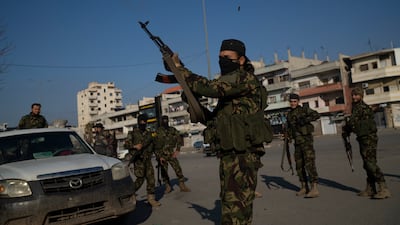Interim government forces led by Hayat Tahrir Al Sham killed two people on Sunday in Syria's Alawite areas in the central governorate of Homs, residents said.
A municipal worker said the people were killed in an HTS raid on Al Fukani village, near the provincial capital of Homs. The attacking force also apprehended dozens of mostly young men on suspicion of having been enforcers for the regime of former president Bashar Al Assad, he said.
“They came with a list of people they said are wanted for having blood on their hands,” he told The National, adding that those killed were the sons of a wanted man. “Some households resisted but most opened their doors.”
A doctor in the city of Homs said he treated several people injured in clashes from an overnight search of the neighbourhoods of Al Nuzha and Al Zahra, where HTS personnel armed with automatic rifles detained dozens of people. “At this rate, there will be only women and children left in the two districts,” he said.
Hours before the raids, the Military Operations division of HTS urged anyone with the rank of captain or above in the Assad regime's military to surrender to so-called settlement centres, where their record would be examined.
“Any officer who is tardy will be subject to legal accountability,” a Military Operations statement said.
HTS, which has origins in the extremist Al Nusra Front and Al Qaeda, has extended its control over most of the country since ousting Mr Al Assad in December, marking a Sunni political ascendancy decades after Alawite officers took power in a 1963 coup.
The 54-year rule of Mr Al Assad and his father, Hafez Al Assad, involved widespread killings and mass disappearances, mainly among the majority Sunni population, especially after the outbreak of a 2011 uprising demanding an end to the family's rule. Alawites comprised about 10 per cent of Syria's 22 million population on the eve of the uprising.
Syria is at the crossroads of the Middle East's struggles. The downfall of Mr Al Assad has forced Shiite Iran and its Hezbollah ally to pull out of the country, in a major shift of the politico-religious dynamics in the region.
But US, Turkish and Russian forces remain stationed in Syria, backing different factions in conflicts that started in late 2011 after the authorities killed thousands of civilians in the crackdown on mass pro-democracy demonstrations.
HTS, which has been methodically replacing the mostly Alawite general managers in the government, previously vowed to persecute elements of the former regime it said have been involved in the atrocities. But the group, led by Ahmad Al Shara, is also seeking outside support to rebuild the country.
On Sunday, Asaad Al Shibani, the Foreign Minister in the new administration and a long-time associate of Mr Al Shara, met in Doha with Qatari Prime Minister Sheikh Mohammed bin Abdulrahman.
Sheikh Mohammed expressed Qatar's support for the unity of Syria and “meeting the expectations of its people for a decent living and building a state of law and institutions”, the official Qatari news agency said.
Western powers, alarmed by HTS incursions into Alawite coastal areas in the last three weeks, have been urging Mr Al Shara to avoid bloodshed. German Foreign Minister Annalena Baerbock, who met Mr Al Shara in Damascus two days ago, said she had urged his government to avoid “acts of vengeance against groups within the population” and to refrain from subjecting the justice and education systems to religious dogma.
In an interview with the Financial Times, US Secretary of State Antony Blinken said the state of flux in Syria could usher in “incredible possibility, especially after the horrors of the Assad dictatorship”.
“But we’ve seen too many times when one dictator’s been replaced by another,” he warned.


